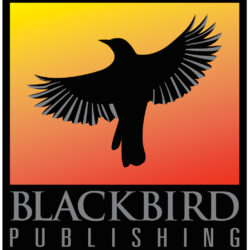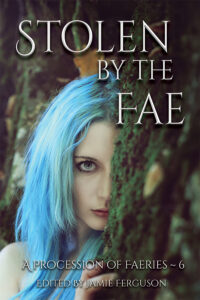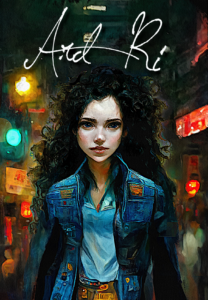“Honeysuckle and Blue,” by Karen L. Abrahamson, appears in Stolen by the Fae, the 6th volume in the anthology series A Procession of Faeries.
Excerpt
I should have paid more attention to what Posey said, but at the time I was just so relieved to find her.
“There you are! I’ve been looking all over! How did you get out here?” The common room door had been locked when I came out.
Posey didn’t even look up. Warm sunlight filled the garden courtyard the air, so thick with honeysuckle it was like syrup. The riot of perfumed vines wound through wisteria and together they climbed a wooden trellis and garlanded the building eaves in purple and rose gold. Peonies bobbed their heavy white-and-pink heads on a breeze filled with the buzz of happy bees. Posey knelt in a patch of sun-warmed loamy soil amidst a riot of apricot and peach ranunculus, her palm outstretched and seemingly filled with sun.
She was a small woman, barely more than fine skin stretched over bird bones. The kind of thin you might see on a ballet dancer in their youth, but on the aged only screamed that their days were numbered. Some of the residents struggled against the inevitable as they wasted away. Others simply smiled as bits of them escaped with their memories. Posey was one of those. She always had a happy smile and the clearest blue eyes you could imagine. Incongruously, she had a luxurious head of white hair that the other care aides despaired of because of the amount of care that it required. They’d tried to convince Posey to let them cut it off, but she screamed when anyone came near her with a set of scissors. So, every morning we pulled her hair back into a braid and sometime during the day Posey would manage to release it.
Like now. The cascade of white hair tumbled down her narrow shoulders to pool around her hips and knees like a silver gown. Of course, the hair elastic was nowhere to be seen. In a way, she reminded me of my daughter—when she was five.
In a hurry to get her back to her unit, I crossed the courtyard pavers—and stopped.
“Posey, honey… what are you doing?”
By all rights she should have been in her room like everyone else was until they were called for lunch, but her upright palm held three bumble bees, that buzzed and—danced?
—from “Honeysuckle and Blue,” by Karen L. Abrahamson, in Stolen by the Fae
About Karen
Author of the century-spanning Cartographer Series, Karen L. Abrahamson writes fantasy, romance and mystery. Her short fiction has been short listed for the Derringers and Canadian Crime Writer’s Best Short Story. She lives in British Columbia, Canada with bears, bald eagles and the ocean for neighbours.
Find Karen
Website ~ Facebook ~ BookBub ~ Amazon ~ Goodreads
Find Stolen by the Fae
Universal Book Link ~ Amazon ~ Apple Books ~ Barnes & Noble ~ Kobo ~ BookBub ~ Goodreads
A Procession of Faeries
Learn more about the series, and follow A Procession of Faeries on Facebook and Goodreads!

Sign up for the Blackbird Publishing newsletter!



